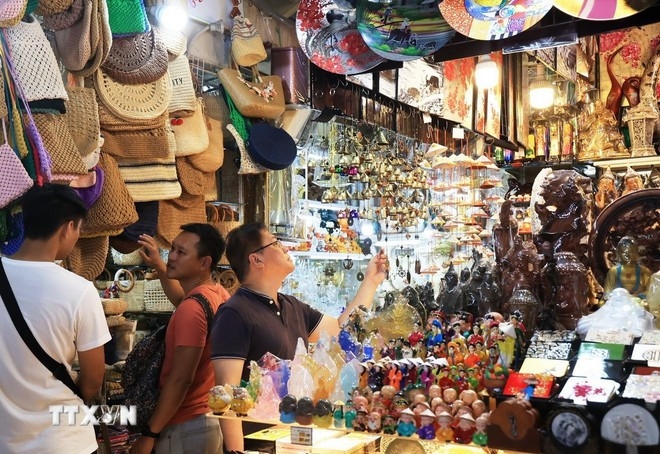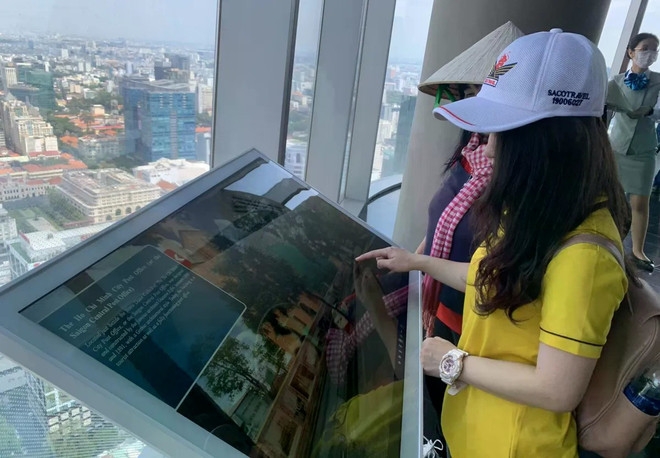HCM City optimises digital transformation to enhances tourists’ experience
Cập nhật: 26/10/2025
![]() Images of the world’s rarest snub-nosed monkey in Tuyen Quang
Images of the world’s rarest snub-nosed monkey in Tuyen Quang
![]() HIEUTHUHAI gây chú ý với vẻ ngoài thư sinh tại buổi tổng duyệt GENfest
HIEUTHUHAI gây chú ý với vẻ ngoài thư sinh tại buổi tổng duyệt GENfest
Ho Chi Minh City has identified the adoption of information technology and digital transformation as key strategies to enhance the visitor experience, facilitate tourism services, and drive economic growth in the tourism sector.

Digital transformation - A breakthrough for tourism development
According to the municipal Department of Tourism, digital transformation and the development of smart tourism are not just trends but crucial breakthroughs that enhance competitiveness and ensure sustainable development. From a service delivery perspective, applying technology will help create more attractive tourism products, improving visitor convenience when accessing services such as accommodation, shopping, and tours.
Recently, the city launched the “3D/360 Interactive Tourism Map” which provides up-to-date information on various attractions, including historical sites, museums, entertainment venues, conference centres, and hotels. The tourism sector is also working to digitise nearly 700 tourism resources, promoting products and services through e-commerce platforms, making it easier for locals and tourists to search and book travel services or local specialties.
To further enhance the tourist experience, the Department of Tourism has collaborated with Foody Corporation (the operator of the ShopeeFood app) to launch the “Foodie Passport” programme. This smart tool helps visitors explore and document their gastronomic journey through the city.
Bui Thi Ngoc Hieu, Vice Director of the Department of Tourism, noted that the city has introduced 21 thematic food tourism programmes and updated the digital version of the Ho Chi Minh City Culinary Guide. The new guide covers diverse food spots in Ho Chi Minh City, Binh Duong, and Ba Ria-Vung Tau areas, showcasing the region’s culinary identity.
Alongside tourism, the municipal Department of Science and Technology is actively advancing digital transformation in culture and heritage conservation, linked with tourism development. Recently, it completed the research task on applying GIS technology in managing land and structures within the HCM City National History and Culture Park. Many data sets related to the park have been digitised, including information on festivals, folk arts, trees, and architecture, improving urban management and facilitating access for residents and tourists exploring cultural and historical landmarks.

Pham Phuong Mai from Van Hien University, observed that the city has developed numerous cultural and tourism products integrated with digital technology, reinforcing the appeal of a smart destination. Several museums now use virtual and augmented reality, robotic guides, online exhibitions, and digitised artefacts. The HCM City History Museum employs a robot guide and 3D exhibitions, while the HCM City Fine Arts Museum offers automated information stations. The War Remnants Museum has virtual tours and 3D exhibitions, and the Ho Chi Minh Museum has launched a VR and AR project to enhance the visitor experience.
Towards green, smart, and sustainable tourism
Nguyen Trung Khanh, Director of the Vietnam National Tourism Authority, commended HCM City for its innovative application of technology in tourism. Initiatives like e-tickets, cashless payments, destination digitalisation, virtual reality, light displays, and drones are contributing to unique products that enhance the experience for both domestic and international tourists. The use of artificial intelligence (AI), big data, and energy-efficient technology is becoming increasingly important in tourism management, event organisation, market analysis, customer management, and travel consultancy.
In the new phase of development after the administrative boundary adjustments, Hien recommended that HCM City develop a smart tourism map, multilingual information systems, and personalised itinerary suggestions using AI. Expanding cashless payment tools, especially for international tourists, and introducing virtual and augmented reality for promoting heritage sites, museums, and industrial zones could create new, exciting experiences for tech-savvy, creative younger tourists.
Bui Thi Ngoc Hieu, Vice Director of the city Department of Tourism, affirmed that the tourism sector will continue to encourage officials, workers, businesses, and communities to actively apply technology, propose innovations, and share practical solutions. These efforts will help realise the vision of "green, smart, and sustainable tourism."
Every digital solution, no matter how small, contributes to creating a safer, more attractive, and convenient tourism experience, while also enhancing the city’s competitive edge, advancing Vietnam’s tourism sector into a modern, creative, and globally integrated industry.
![]() Từ khóa: HCM City , HCM City,digital transformation,tourism sector,tourists
Từ khóa: HCM City , HCM City,digital transformation,tourism sector,tourists
![]() Thể loại: Văn hóa - Giải trí
Thể loại: Văn hóa - Giải trí
![]() Tác giả: vna
Tác giả: vna
![]() Nguồn tin: VOVVN
Nguồn tin: VOVVN